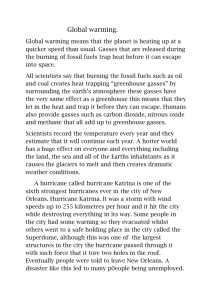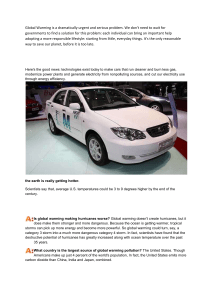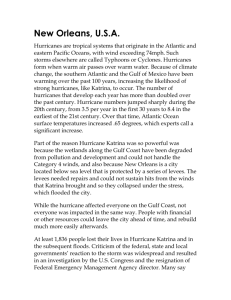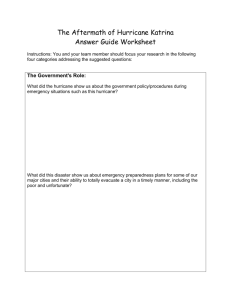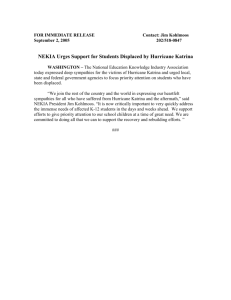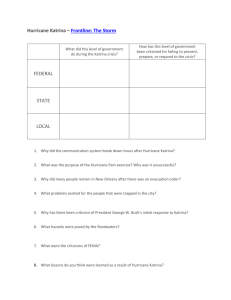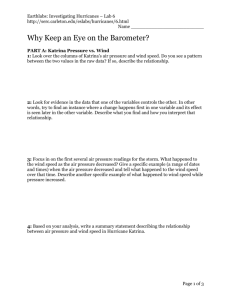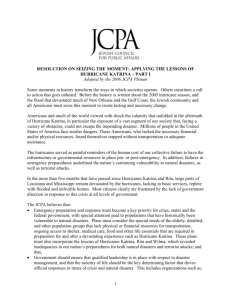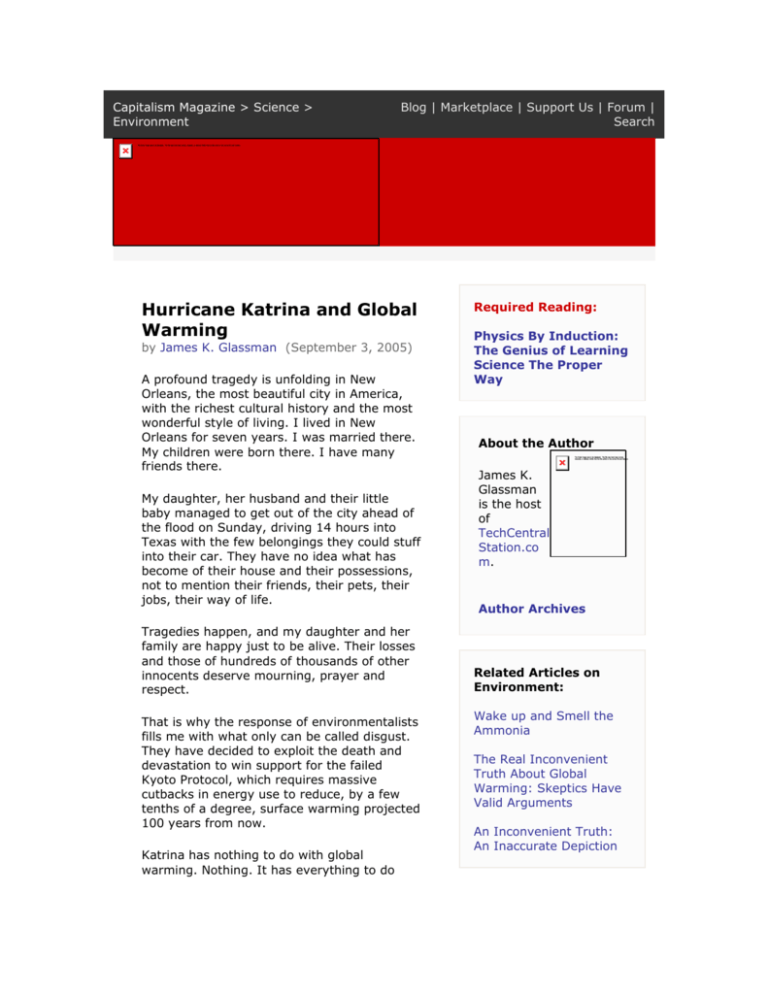
Capitalism Magazine > Science >
Environment
Blog | Marketplace | Support Us | Forum |
Search
Hurricane Katrina and Global
Warming
by James K. Glassman (September 3, 2005)
A profound tragedy is unfolding in New
Orleans, the most beautiful city in America,
with the richest cultural history and the most
wonderful style of living. I lived in New
Orleans for seven years. I was married there.
My children were born there. I have many
friends there.
My daughter, her husband and their little
baby managed to get out of the city ahead of
the flood on Sunday, driving 14 hours into
Texas with the few belongings they could stuff
into their car. They have no idea what has
become of their house and their possessions,
not to mention their friends, their pets, their
jobs, their way of life.
Tragedies happen, and my daughter and her
family are happy just to be alive. Their losses
and those of hundreds of thousands of other
innocents deserve mourning, prayer and
respect.
That is why the response of environmentalists
fills me with what only can be called disgust.
They have decided to exploit the death and
devastation to win support for the failed
Kyoto Protocol, which requires massive
cutbacks in energy use to reduce, by a few
tenths of a degree, surface warming projected
100 years from now.
Katrina has nothing to do with global
warming. Nothing. It has everything to do
Required Reading:
Physics By Induction:
The Genius of Learning
Science The Proper
Way
About the Author
James K.
Glassman
is the host
of
TechCentral
Station.co
m.
Author Archives
Related Articles on
Environment:
Wake up and Smell the
Ammonia
The Real Inconvenient
Truth About Global
Warming: Skeptics Have
Valid Arguments
An Inconvenient Truth:
An Inaccurate Depiction
with the immense forces of nature that have
been unleashed many, many times before and
the inability of humans, even the most
brilliant engineers, to tame these forces.
Giant hurricanes are rare, but they are not
new. And they are not increasing. To the
contrary. Just go to the website of the
National Hurricane Center and check out a
table that lists hurricanes by category and
decade. The peak for major hurricanes
(categories 3,4,5) came in the decades of the
1930s, 1940s and 1950s, when such storms
averaged 9 per decade. In the 1960s, there
were 6 such storms; in the 1970s, 4; in the
1980s, 5; in the 1990s, 5; and for 2001-04,
there were 3. Category 4 and 5 storms were
also more prevalent in the past than they are
now. As for Category 5 storms, there have
been only three since the 1850s: in the
decades of the 1930s, 1960s and 1990s.
But that doesn't stop an enviro-predator like
Robert F. Kennedy Jr. from writing on the
Huffingtonpost website: "Now we are all
learning what it's like to reap the whirlwind of
fossil fuel dependence which Barbour and his
cronies have encouraged. Our destructive
addiction has given us a catastrophic war in
the Middle East and - now -- Katrina is giving
our nation a glimpse of the climate chaos we
are bequeathing our children."
Or consider Jurgen Tritten, Germany's
environmental minister, in an op-ed in the
Frankfurter Rundschau. He wrote (according
to a translation prepared for me): "By
neglecting environmental protection,
America's president shuts his eyes to the
economic and human damage that natural
catastrophes like Katrina inflect on his country
and the world's economy."
The bright side of Katrina, concludes Tritten,
is that it will force President Bush to face
facts. "When reason finally pays a visit to
climate-polluter headquarters, the
international community has to be prepared
to hand America a worked-out proposal for
the future of international climate protection."
of the State of Global
Warming Science
Global Warnings from the
Ivory Tower: Debate and
Die
Global Warming Scares
Heat Up
Reject Environmentalism,
Not DDT
Environmentalist Gridlock
The New Nomenklatura
"Saving" What From
Whom?
Global Warming: The
Other Side of the Story
On Earth Day,
Remember: If
Environmentalism
Succeeds, It Will Make
Human Life Impossible
Who Will Defend Industry
from Eco-Terrorism?
Technological Apartheid:
Europe's Biotech Food
Ban Must End
Open Kyoto to Debate
Green Lies and "Open
Spaces"
More Articles on
Environment
He goes on, "There is only one possible route
of action. Greenhouse gases have to be
radically reduced, and it has to happen
worldwide." In other words, thanks to Katrina,
we'll finally get Kyoto enforced. (He might
start at home, by the way. Europe is not
anywhere close to reducing CO2 to Kyoto
standards. In fact, the U.S. is doing much
better than many Kyoto ratifiers.)
Ross Gelbspan, in a particularly egregious,
almost giddy piece in the Boston Globe that
was reprinted in the International Herald
Tribune, wrote that the hurricane was
"nicknamed Katrina by the National Weather
Service Katrina, [but] its real name was
global warming." He also finds global warming
responsible for droughts in the Midwest,
strong winds in Scandinavia and heavy rain in
Dubai. The reason for all this devastation, of
course, is that the Bush Administration is
controlled by coal and oil interests.
And the Independent, a widely read British
newspaper, reported today that "Sir David
King, the British Government's chief scientific
adviser, has warned that global warming may
be responsible for the devastation reaped by
Hurricane Katrina." King contended that "the
increased intensity of hurricanes is associated
with global warming."
The Kyoto advocates point to warmer ocean
temperatures, but they ought to read their
own favorite newspaper, The New York Times,
which reported yesterday:
"Because hurricanes form over warm ocean
water, it is easy to assume that the recent
rise in their number and ferocity is because of
global warming. But that is not the case,
scientists say. Instead, the severity of
hurricane seasons changes with cycles of
temperatures of several decades in the
Atlantic Ocean. The recent onslaught 'is very
much natural,' said William M. Gray, a
professor of atmospheric science at Colorado
State University who issues forecasts for the
hurricane season.'"
An article on TCS quoted Gray last year as
saying that, while some groups and
individuals say that hurricane activity lately
"may be in some way related to the effects of
increased man-made greenhouse gases such
as carbon dioxide,…there is no reasonable
scientific way that such an interpretation…can
be made."
Indeed, there is no evidence that hurricanes
are intensifying anyway. For the North
Atlantic as a whole, according to the United
Nations Environment Programme of the World
Meteorological Organization: "Reliable
data…since the 1940s indicate that the peak
strength of the strongest hurricanes has not
changed, and the mean maximum intensity of
all hurricanes has decreased."
Yes, decreased.
Not only has the intensity of hurricanes fallen,
but, as George H. Taylor, the state
climatologist of Oregon has pointed out, so
has the frequency of hailstorms in the U.S.
(see Changnon and Changnon) and cyclones
throughout the world (Gulev, et al.).
But environmentalists do not want to be
bothered with the facts. Nor do they wish to
mourn the destruction and death wreaked on
a glorious city. To their everlasting shame,
they would rather distort and exploit.
Write Us / Printer-friendly / Email This /
Discuss in Forum / Donations
The views expressed here are those of
the author and do not necessarily
represent the views of Capitalism
Magazine. Excerpts are limited to 200
words, so long as the source and link are
provided to the original article.
Reproduction in whole or in part is
prohibited. See our terms of use for
details.
Capitalism Magazineâ„¢ Copyright 2006-1997 Capitalism Magazine. All rights
reserved.
Reproduction in whole or in part without permission is prohibited. Terms of Use.

